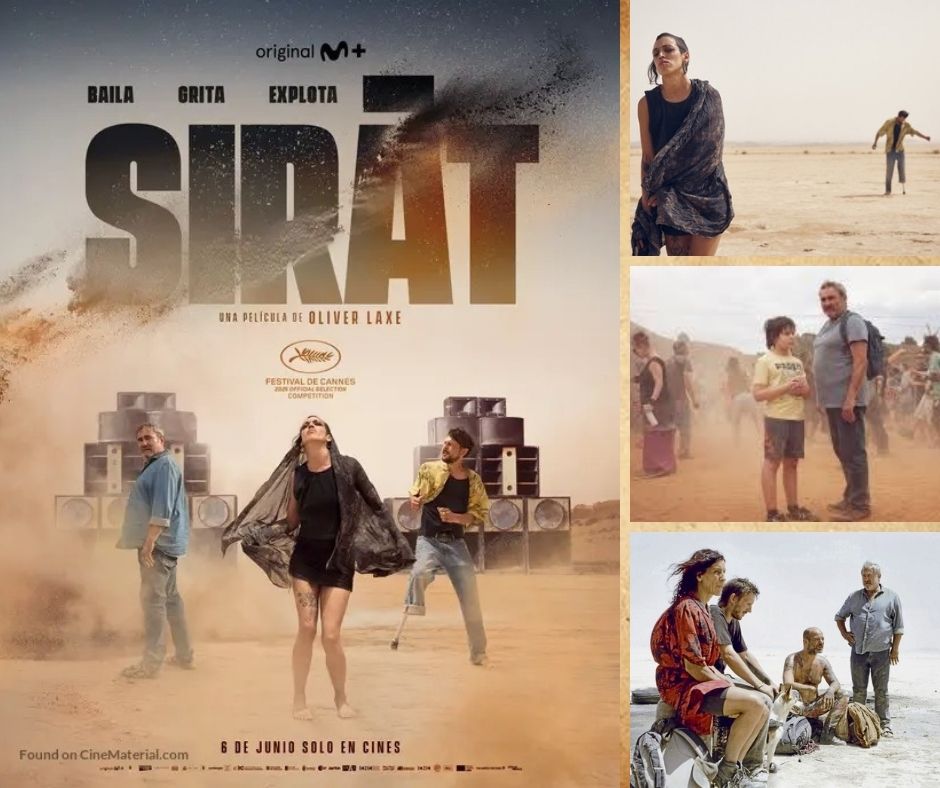Sirât
Road Movie, Desert Rave, Existential Drama.

A van cutting through the endless Moroccan desert. A father and son on a desperate quest. A group of nomads dancing through the night, chasing something just beyond the horizon. It sounds like the setup for a sweeping adventure film. Sirât is that—and more. What Laxe offers is an emotional journey where the impossible destination is a sense of wholeness that may no longer exist. Beneath the surface, it’s a quiet, aching search for meaning—for a daughter, for faith, for connection in a fractured world. An odyssey of grief and spiritual reckoning, where every mile feels like an attempt to stitch something broken back together.
The film often veers into the bizarre—at times even surreal—constantly evoking Mad Max through its imagery of battered vehicles tearing across sand dunes, a pulsing techno soundtrack, and the worn, almost otherworldly look of its characters. But where that franchise dives into chaos, Sirât moves toward something much more tender. Beneath the dust and beats, there’s a striking sense of empathy—an unexpected emotional current that slowly builds between strangers. These people are all running from something, or maybe toward something, and what binds them isn’t ideology or history, but suffering. That shared pain becomes the foundation for something that resembles family. A bond born not out of circumstance, but understanding.
We don’t get much background on the group. In fact, we barely get any. But it’s clear they’ve lost a lot. There are no tidy monologues explaining what happened or who they used to be. And that works. Because in Sirât, it’s not the past that matters—it’s the act of moving forward. Even questions like how the father can afford to drive off in search of his daughter feel irrelevant.
As an adventure, Sirât genuinely works. The van feels like a fragile lifeline, and there are moments when you wonder if it’ll make it. The harsh terrain and constant uncertainty give the film real momentum. As the group moves deeper into the desert, faces that once felt distant start to matter, and a family begins to form.
The film contains two extraordinary and unforgettable scenes that change its trajectory. One gut-wrenching moment midway through involving a handbrake, and another in the third act that’s pure dynamite. These scenes push the characters into new emotional territory while still keeping the film cohesive and grounded.
By the final stretch, the film has shifted into more existential territory. The rave energy fades, replaced by something quieter and more introspective. Grief becomes central. Dialogue is minimal, but meaningful. A father remembering a final phrase. A glance that says enough. Laxe avoids overexplaining—he trusts the silence. That quiet confidence extends to how he frames the entire film, balancing the grand and the intimate with striking clarity.
The Moroccan landscape is captured in all its harsh beauty—shot on Super 16mm by Mauro Herce—and the sound design, paired with Kangding Ray’s sparingly used but haunting score, is hypnotic. The music isn’t just background—it carries emotional weight. The characters use it to cope, to escape. In those dance scenes, they’re not just moving—they’re releasing something. It’s one of the few ways they can feel free, even if just for a moment.
If anything, the film’s final stretch could have gone even deeper. There’s a sense that Sirât is circling something profound—and while it mostly gets there, a few more steps into the abyss might have made the payoff even more powerful. Yet you’re always drawn in—completely immersed in this strange, broken world.
Sirât is a film about movement—not just across land, but through grief, doubt, and connection. It begins as a search for someone lost, and becomes a story about finding something else entirely: community, healing, the will to keep going. It might sell itself like a bizarre desert rave drama or an offbeat road movie. But it’s something deeper—one that takes its time to settle.